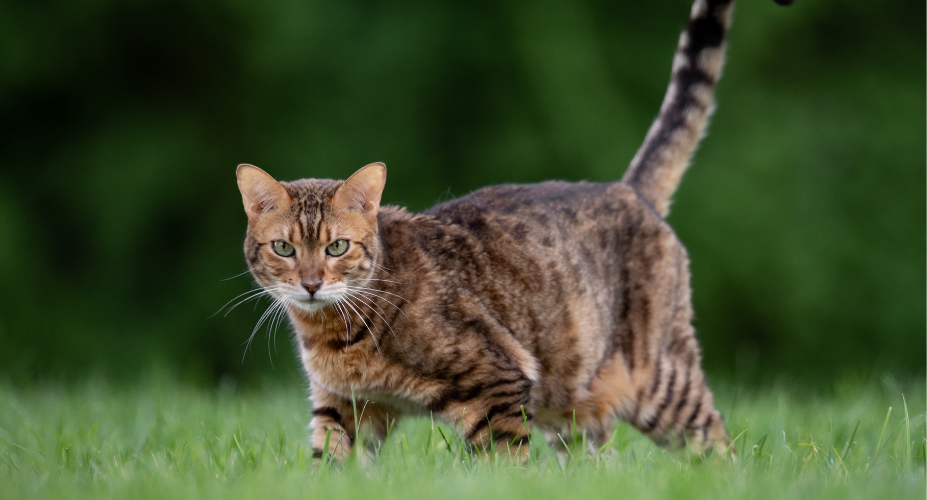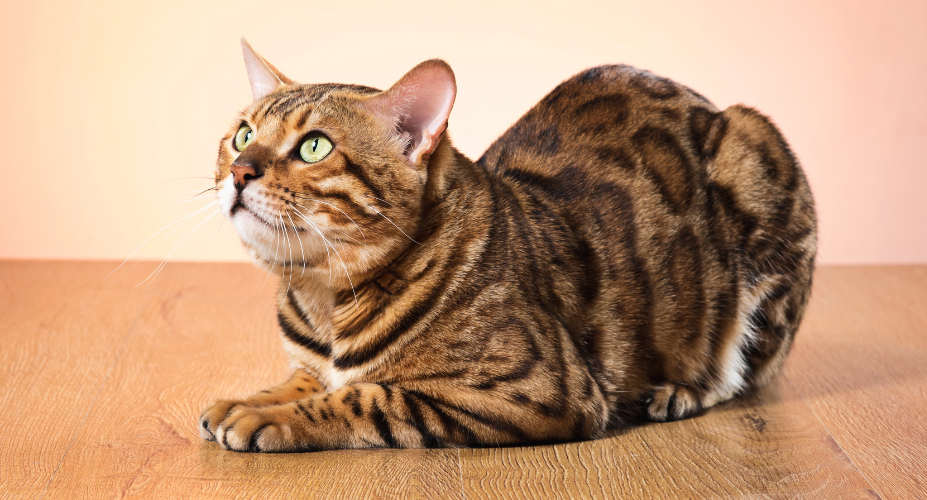Do Bengal Cats Snore? Understanding Your Feline's Nocturnal Habits
Do Bengal Cats Snore? Understanding Your Feline's Nocturnal Habits
Have you ever wondered, Do Bengal cats snore? If so, you're not alone. Bengals, known for their striking appearance and dynamic personalities, also have some unique behaviors, including their sleeping habits. Snoring in cats can be quite a surprise for many pet owners, and Bengals are no exception. While not all Bengals will snore, some do exhibit this behavior due to various reasons, including their physical characteristics, sleeping positions, and health conditions.
Understanding why your Bengal cat might be snoring is crucial, not only for their comfort but also for ensuring they are in good health. This article describes the snoring Bengals, exploring the reasons behind this phenomenon, health considerations, and tips for improving your feline friend's sleep quality.
Understanding Snoring in Cats
Snoring in cats is a phenomenon that occurs when there is a partial obstruction in the airway, causing a vibration of the soft tissues during sleep. This can result in the characteristic snoring sound that some pet owners may find endearing or concerning. The reasons for snoring in cats are multifaceted and can range from benign to more serious health concerns.
Common factors that contribute to snoring include the cat's sleep position, which can compress the airway; obesity, which can lead to excess tissue around the neck and throat; respiratory illnesses that cause nasal congestion or inflammation; and breed-specific traits that may predispose certain cats to snoring.
Bengals, with their distinctive wild ancestry, may have unique anatomical features that could affect their breathing during sleep. However, it is important to note that not all Bengals will snore, and those that do may not do so consistently. Observing your Bengal's sleep patterns and snoring frequency can provide valuable insights into their overall well-being and alert you to any changes that may warrant a veterinary consultation.
Do Bengals Snore?

Snoring in cats, while not as common as in humans or dogs, can occur and is often a source of both amusement and concern for pet owners. Bengals, with their exotic lineage and active demeanor, are not immune to this nighttime quirk. Some Bengals may snore due to a variety of factors, including their physical build, sleeping posture, or underlying health issues.
It's essential to discern the normalcy of snoring in your Bengal and to recognize when it may signal a health problem that requires veterinary attention. This article will explore the reasons behind snoring in Bengals, the experiences of other Bengal cat owners, and provide guidance on when to seek professional advice for your snoring feline friend.
What causes bengals to snore?
Bengals can snore due to various factors such as their sleeping position, obesity, respiratory illnesses, or breed-specific anatomical traits. Snoring in cats, including Bengals, is essentially caused by airway obstruction leading to the vibration of soft tissues during sleep.
It's important for Bengal owners to observe their cat's snoring patterns, as changes in intensity, frequency, or accompanying symptoms like coughing could indicate underlying health issues that require veterinary attention.
Regular veterinary check-ups, maintaining a healthy weight, providing a comfortable sleeping environment, and ensuring they get enough exercise can help reduce snoring and promote better sleep for Bengals.
Health Considerations for Snoring Bengals
When it comes to our feline friends, especially the exotic and vibrant Bengals, their behaviors can often leave us both amused and puzzled. Among these behaviors, snoring is one that raises questions and sometimes concerns among pet owners. So, do Bengals snore? The answer is yes, some Bengal cats do snore, but it's not a trait specific to the breed alone.
Snoring in Bengal cats, as in other cats, can be attributed to various factors including their physical build, sleeping posture, or underlying health issues. Understanding these factors is essential for ensuring the well-being of your Bengal and knowing when their snoring might be a sign of a more serious condition.
Snoring in cats is essentially the result of airway obstruction, which leads to the vibration of soft tissues during sleep. This can be caused by a cat's sleeping position, obesity, respiratory illnesses, or breed-specific anatomical traits. For Bengal cats, their unique genetic makeup might influence their predisposition to certain conditions, but snoring itself is not exclusive to Bengals. It's important for pet owners to observe their cat's snoring patterns, as occasional snoring might not be a cause for alarm.
However, changes in snoring intensity, frequency, or accompanying symptoms such as coughing, sneezing, or changes in behavior could indicate health issues that require veterinary attention. Health considerations for snoring Bengal cats include the potential for respiratory conditions or obesity, both of which can contribute to snoring.
Respiratory infections, for instance, can cause nasal congestion leading to snoring, and obesity can lead to excess tissue around the neck and throat, further obstructing the airway. It's crucial to differentiate between normal snoring and signs that may indicate a health problem. Sudden onset of snoring, increased snoring volume, or snoring accompanied by other symptoms are red flags that should prompt a visit to the vet.
Improving Your Bengal's Sleep and Reducing Snoring

Ensuring your Bengal has a good night's sleep and minimizing snoring involves a combination of proper diet, exercise, and a comfortable sleeping environment. Here are some tips to help your Bengal rest better and potentially reduce snoring:
Weight Management
Obesity can contribute to snoring in cats by causing extra tissue to press on the airway. To prevent or address weight issues:
- Consult with your veterinarian to create a weight loss plan tailored to your Bengal cat's needs.
- Determine the ideal weight for your cat and set a reasonable target for weight loss or maintenance.
- Choose high-quality cat food with high protein content and low carbohydrates, specifically designed for weight management.
- Measure food portions accurately and feed your cat several small meals throughout the day to encourage healthy digestion and prevent overeating.
Comfortable Sleeping Environment
A comfortable and quiet sleeping area can significantly improve your Bengal's sleep quality:
- Provide a soft bed or blanket in a quiet corner of the house, away from noisy areas and foot traffic.
- Ensure the sleeping space is clean, free of hazards, and has a consistent temperature. Cats prefer warm environments, so consider a heated bed or warm blanket.
- If your Bengal enjoys enclosed spaces, a hooded cat bed can offer a secure and comfortable resting spot.
Regular Exercise
Physical activity is crucial for your Bengal's overall health and can also help them sleep better:
- Engage your cat in interactive play to satisfy their prey drive and keep them active. Use toys that allow them to hunt, stalk, and chase.
- Establish a routine that includes playtime to help your cat expend energy and be more inclined to rest.
Regular Veterinary Check-ups
Routine health examinations are essential for monitoring your Bengal's overall health and addressing any underlying issues that could affect their sleep:
- Regular check-ups can help detect health issues early, including those that may cause or exacerbate snoring.
- Veterinarians can provide advice on dental care, nutrition, and weight management, all of which can impact your cat's sleep quality.
By implementing these strategies, you can help your Bengal achieve better sleep and reduce the likelihood of snoring. Remember, if you notice any sudden changes in your cat's snoring patterns or other signs of health issues, consult your veterinarian promptly.
Conclusion
In the world of feline companions, Bengals stand out with their exotic looks and lively nature. But when the lights go out, some Bengal owners might notice a peculiar sound: the gentle, sometimes not-so-gentle, rumble of snoring. It's true, Bengals, like their human counterparts, can snore while they slumber.
This article has explored the various facets of snoring in these beautiful cats, from the reasons that might cause them to snore to the health implications that should not be ignored. As we've discussed, snoring in Bengals can be influenced by factors such as their breed-specific characteristics, sleeping positions, and overall health.
While a softly snoring Bengal can be a normal and even endearing trait, it is important for owners to remain vigilant. Changes in snoring patterns or intensity could be indicative of health issues such as respiratory problems or obesity, which warrant professional veterinary advice.
To ensure the health and comfort of your Bengal, regular veterinary check-ups are crucial. These visits can help identify and address any underlying health concerns that may be causing or contributing to your cat's snoring. Additionally, maintaining a healthy weight for your Bengal, providing a comfortable sleeping environment, and ensuring they get plenty of exercises can all contribute to reducing snoring and promoting better sleep.
In summary, while snoring may be a common occurrence in Bengals, it is essential for owners to monitor their pets' snoring habits. Paying close attention to your Bengal's nocturnal noises can help you catch potential health issues early and keep your feline friend purring and healthy for years to come. If you ever find yourself questioning your Bengal's snoring, do not hesitate to reach out to your vet for guidance and peace of mind.



.jpg)



